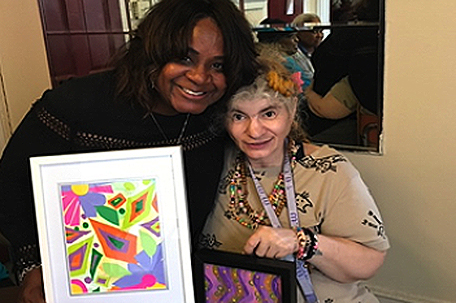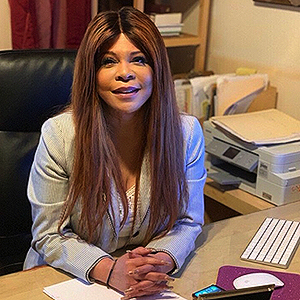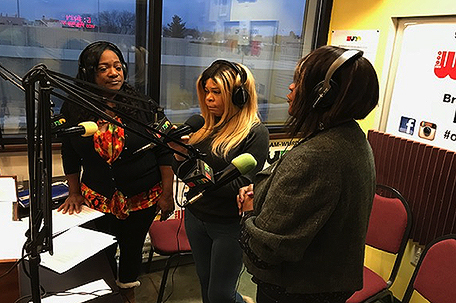
ABOVE PHOTO: Tracey Taylor, Owner/Administrator, Taylor’s Personal Care Home in North Philadelphia, with one of her residents.
By Thera Martin
According to the Homeguide.com website, it costs, on average, $40 per day to board a dog. The larger the dog, the higher the costs, which can run as high as $85 per day. And according to Thumbtack.com, pet boarders charge $40 to $60 per day, the national average rate.
“Kaysim uses dogs as pet therapy so we understand the importance of taking care of our animals. No shame in caring about animals,” says Kawana Blake, the owner and administrator of the Kaysim Housing Group. “I’m a dog lover through and through. My dogs even come to work with me almost every day. However, aren’t people with mental health challenges, special and deserving of good care, too?”
Blake founded Kaysim Housing Group 19 years ago at 5909-19 Wayne Avenue, which is located in historic Germantown. Blake is the second generation in this business. Like her late mother who started a personal care business in the late 1980s, Blake is passionate about making sure people who depend on PCHs get their just due. Problem is, Blake says, operators and owners of personal care homes in Philadelphia haven’t gotten an increase in funding from the Commonwealth of Pennsylvania since 2006.
“To operate a personal care home is much more than a notion,” she said. “I do it with love and passion. I do it with compassion and care and I demand the same from all of my staff as we take care of the people who live at Kaysim Court Manor. The residents here are my extended family. Truth be told, it was African American women in the early 1960s that first started operating licensed personal care homes in Philadelphia. The way I see it, they were pioneering Black women entrepreneurs who were amongst the first to step out and say, ‘we care about people with mental health disabilities who have nowhere to call home. We want to provide them with a home setting and make sure they are taken care of.’”
“All along from the very beginning , it’s been very challenging for the majority of African American-owned and operated personal care homes in Philadelphia to get the kind of financial respect that other organizations similar to ours receive,” Blake continued. “Somewhere around one billion dollars is spent a year in Philadelphia County alone on mental health. That’s an awful lot of money – and where’s it going? Administrators and licensed operators of personal care homes in Philadelphia are doing a good job. If we weren’t, our licenses wouldn’t be renewed.”
“We offer by and large the very same services residents at private pay personal care homes receive, (like Sunrise Assisted Living Homes), for example, receive, she said. “But we don’t get equal funding by a long shot. I’m a part of an organization called South East Regional Caregivers Alliance, (SERCGA), and a number of us for the last few years, have been traveling around, meeting with elected officials and working to lobby for more funding for personal care homes. We appreciate that Pennsylvania State Senators Vincent Hughes and Sharif Street have met with us. We are believing they will speak up on behalf of the mentally challenged people who live in our facilities so that our service level can increase even more. We’ve met with State Representative Steve Kinsey and he’s working to see what he can do. We’ve also met with Pennsylvania State Representative Donna Bullock. These lawmakers I’ve named displayed concern and interest, but they can’t put the money in the state budget by themselves. They need other lawmakers from around the state to also support the idea of giving more funding to licensed personal care home owners.”
Sandra Wooters, MHS, ACG — who recently retired as the coordinator for the Philadelphia County /Southeast Region Adult Residential Licensing Unit for the PA Department of Public Welfare — is an advocate for personal care homes.
“There’s different kinds of housing models for people who need special living arrangements across the state of Pennsylvania,” she said. “Personal care homes are the lowest paid and the lowest funded of housing models. Yet they have to provide 24-hour care, room and board, supervision, bathing equipment, soap, shampoo, all your personal hygiene products, laundry, for less $37 a day per resident. Other housing models in the state get $200 a day, or $150 a day, and personal care home residents only get $37 a day. As you know, that’s not a lot of money to take care of someone who has severe mental illness or [who] has severe physical needs that are older adults. I think it really is a sad [commentary] that we don’t pay personal care home operators for what they provide to these seniors and older adults with mental illness.”
“I don’t know what the stumbling block is in Pennsylvania,” Wooters continued. “I know in New Jersey, they offer a $50 a day waiver for people with SSI who live in personal care homes. That certainly helps New Jersey facilities that provide assistance for people with mental health challenges. In Pennsylvania, it seems to me that decision-makers may not have a full understanding of what Supplemental Security Income homes get, because high income facilities charge $5,000-10,000 a month per resident for the same care that the Department of Public Welfare requires personal care home owners to provide to their residents. SSI recipients living in these personal care homes can only afford to pay $1,125.30 to $1,145.30 a month. That breaks down to $37 a day, when they get on the supplement.”

While Kawana Blake, Tracey Taylor, the owner/administrator of Taylor’s Personal Care Home and others from the personal care home owner’s world have been making their rounds to lawmakers asking for help, no promises have been made thus far. However, both Blake and Taylor say they’re hopeful that lawmakers will find a way to readjust their budget for the fiscal year starting on July 1, 2019 to allocate some additional funds for personal care homes. Remember, they’ve had no increase since 2006.
“We’ve been able to serve the community since my mother first opened our home back in 1968,” Taylor, whose business is located at 2113 W. Hunting Park Avenue, said. “My mother passed in 2012, and since then, I’ve been the lead administrator for Taylor’s Personal Care Home. Like Kawana, I found myself being adopted into this industry and I fell in love with what I do. I love the people we serve. But we do need the support of our legislators at the city, state and federal level in order to keep the doors of our homes open. We are their extended family. A lot of times the residents we welcome have no one else they can depend on. We’re there for them 24-7. It’s about what it means to be human. Mental illness does not discriminate. It doesn’t care about gender, race or creed.”
Here’s how it goes when the system (the government) works the right way at personal care homes when a new resident moves in:
• Starting immediately, the personal care home will receive $22 a day for giving the individual a clean room, three meals a day, a shower or bath and full bathroom needs, plus group mental health sessions and/or one-on-one sessions as needed, etc.
• Once the Social Security office is apprised of the fact that resident “A” lives at Kaysim Housing Group, Inc., the Supplemental Security Income, (SSI) payment is increased to $37 dollars a day, which takes about a year.
According to Blake, Community Rehabilitation Residences get approximately $3,000 a month per resident, while personal care home residents get approximately $1,000 a month, per resident. That’s quite a disparity in numbers.
“I was even told by a representative of the Mental Health Partnership who’s been against personal care homes from the beginning, that because some of their staff lived in some personal care homes years ago that were not well run, they refuse to have an open mind about the personal care homes of the 21st century,” she said. “But you can’t rule out the whole industry because of something that happened in a home or two, 30 years ago.”
In 2006, there were approximately 200 licensed personal care homes in Philadelphia owned by African Americans, largely women, but now the city is down to approximately 29 predominately populated SSI personal care homes owned by African Americans.
“Let me put it to you like this,” Blake said. “Most of the residents we take care of should have been diagnosed as intellectually disabled, but because of the age cut-off, they were never diagnosed. Their I.Q. is very low. They are not able to sustain themselves independently. And it’s wrong to put them into apartments. So many of those who don’t do well in apartments come to personal care homes where we save lives and Medicaid dollars. I equate it to putting a 7-year-old into an apartment and then come by to see them once a week. That’s inhumane.”

During a recent Appropriations meeting in Harrisburg, State Rep. Steven Kinsey (D- 201st Dist.) asked the Department of Health and Human Services Deputy Secretary Leesa Allen, whether there was any discussion of a raise for personal care home owners. Fresh on the heels of having met with Blake as a part of his health care concerns, he reserved some time to talk about mental health care people who need good places to live.
“I want to talk briefly about personal care homes,” Kinsey said. “I represented the City of Philadelphia, but I know that even beyond the City of Philadelphia, there are personal care homes that take care of individuals who may have previously been homeless, persons who might have mental health issues, and so forth, and it has been brought to my attention that the daily rate for personal care homes is $37 per day, per individual. It’s been brought to my attention that personal care home providers have not seen a rate increase in over ten years. So I get constant calls, as you can imagine, and I just want to ask you, is your department looking at the rate of personal home care providers, and is there any particular plan to try and increase the rate as well as provide a better quality of life for those individuals who are in personal care homes?”
Rep. Kinsey’s question to Allen led to what sounded like a mumbo-jumbo convoluted answer.
“In terms of personal care homes, many of them take residents who receive Supplemental Security Income (SSI),” Allen responded. “As part of the daily rate, they also receive the Supplemental Security Income for those individuals. We provide a state supplement that’s close to $439 per month, per individual. It is true that we have not increased that rate since 2009. That would require additional state dollars to do so. But what I can say is that we have been working with both our providers, as well as our MCO’s to look at opportunities to provide services to those individuals who might receive them in a personal care home. So for instance, if someone were in a hospital setting and they could be transitioned to the community, are there opportunities for those providers to work more closely with personal care homes to provide that support for those individuals? The answer is yes. We are looking at those opportunities, and will continue to look at other opportunities to increase services in personal care homes.”
“In my opinion, Leesa Allen lied and tried to be misleading during that public hearing,” Blake said. “When SSI recipients come into our homes, they can only pay $22 per day. After approximately a year, when they get on the Supplement, they’re daily rate goes up to $37 max. SSI recipients receive a personal needs allowance of $85 a month, not $40, like Leesa Allen stated. If the government had to budget like we do in personal care, we would have no deficits in Pennsylvania. There’s a lot of waste, fraud and abuse going on in the health care industry.”
Kawana Blake, Tracey Taylor, the Philadelphia African American Personal Care Home Association and SERCGA, declare that lobbying for personal care home owners and for residents will continue. The goal is to get a $20 dollar a day, per person increase in the July 1, 2019 Pennsylvania state budget, as well as an additional $19 dollars per day per person in the 2020 budget.

















Leave a Comment